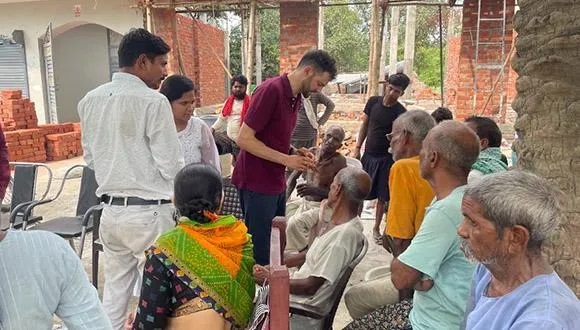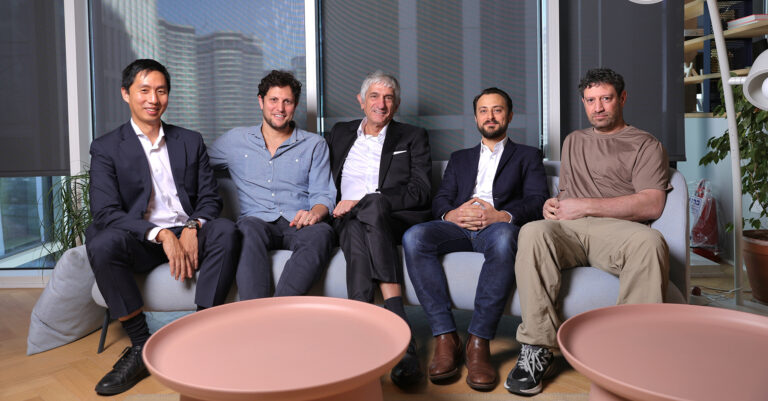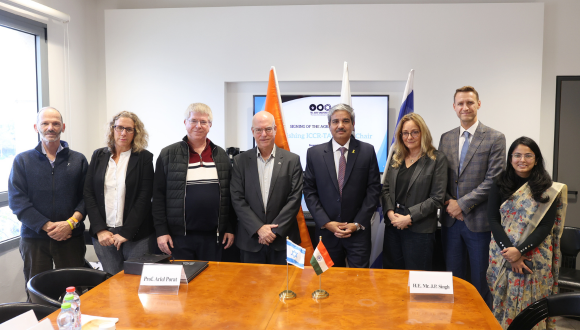Coopération académique : Polytechnique et Weizmann (Israël) signent un accord-cadre, initié par le Pr Victor Malka

[:fr]Jacques Biot, Président de l’École polytechnique, et Daniel Zajfman, Président du Weizmann Institute of Science (Rehovot, Israël), ont signé ce jeudi 26 mai 2016 un accord-cadre de coopération académique. Cet accord vise à développer et promouvoir la coopération entre les deux institutions dans les domaines de l’enseignement et de la recherche.
Ainsi, l’École polytechnique et le Weizmann Institute of Science (WIS), établissements reconnus pour leur recherche de pointe et la qualité de leur enseignement, entendent promouvoir la mobilité de leurs étudiants et de leur corps professoral ainsi que favoriser la coopération scientifique et académique sur des sujets d’intérêt mutuel.
Nommé professeur au département de physique des systèmes complexes du Weizmann Institute of Science à l’automne dernier, Victor Malka, directeur de recherche CNRS au Laboratoire d’Optique Appliquée (LOA), une Unité Mixte de Recherche (ENSTA ParisTech, CNRS, École polytechnique) de l’Université Paris-Saclay, a eu à cœur d’initier un rapprochement entre les deux institutions dont il dépendait : « Il était naturel pour moi d’initier cet accord-cadre afin de faciliter et de promouvoir l’échange d’élèves, la mise en place de collaborations entre l’ensemble des chercheurs de l’X et du Weizmann Institute of Science. Les Présidents de l’École polytechnique et du WIS ont tout de suite étaient séduits par l’idée, ce qui en explique sa concrétisation rapide.»
![]()
Pr Victor Malka,Directeur de recherche CNRS au laboratoire d’Optique Appliquée (X), Professeur à l’Institut Weizman, Université Paris Saclay
Les recherches menées par Victor Malka portent sur les accélérateurs laser-plasma. Imaginé il y a maintenant 30 ans, ce nouveau concept d’accélérateur a permis d’obtenir des faisceaux de particules aux propriétés inédites. Très énergétiques, extrêmement brillants et accordables en énergie, les accélérateurs laser-plasma ouvrent la voie à de multiples applications sociétales dans des domaines aussi variés que la médecine, la chimie, la biologie, la science des matériaux, l’inspection et la sécurité.
Dans le domaine médical, les récents progrès réalisés au Laboratoire d’Optique Appliquée ouvrent la voie à des applications pour le traitement de certaines tumeurs cancéreuses. En particulier, ces travaux offrent de nouvelles perspectives en matière de détection précoce des cancers du sein ou d’évaluation de l’intérêt radiobiologique des rayonnements ionisants. Cette nouvelle technologie laser plasma peut également être utilisée dans le domaine industriel ou pour répondre à des exigences de sécurité pour visualiser en trois dimensions et à haute résolution spatiale les défauts de la matière dense et épaisse que sont par exemple les carlingues d’avions.
Victor Malka travaille actuellement à un rapprochement entre le Laboratoire d’Optique Appliquées de l’X et le département de physique des systèmes complexes du WIS dans le domaine des accélérateurs laser-plasma. Il bénéficie notamment de deux bourses du Weizmann Institute of Science qui lui ont permis de recruter deux doctorants.[:en]Jacques Biot, President of École Polytechnique (Palaiseau, France), and Prof. Daniel Zajfman, President of the Weizmann Institute of Science (Rehovot, Israel), signed May 26th 2016 a cooperation agreement to develop and promote collaboration in higher education and research between the two institutions.
With this agreement, École Polytechnique and the Weizmann Institute of Science, both renowned for their high standards of quality in academics and research, seek to promote the exchange of students and faculty members, as well as to foster scientific and academic cooperation in topics of common interest.
Prof. Victor Malka, Research Director at the Laboratory of Applied Optics, a joint laboratory of École Polytechnique, ENSTA ParisTech and CNRS, joined the Physics of Complex Systems Department of the Weizmann Institute of Science in October 2015. Malka is committed to bring École Polytechnique and WIS closer: “It felt natural to me to initiate this collaboration, to create scientific cooperation. Both presidents − of Polytechnique and the Weizmann Institute of Science − have fully endorsed this initiative, enabling its quick success.”
![]()
Prof Victor Malka
Malka’s research deals with laser-plasma accelerators. This accelerator concept, invented 30 years ago, has enabled researchers to obtain particle beams with unique properties. Very energetic, extremely bright and tunable in energy, these beams open new opportunities in such diverse fields such as medicine, chemistry, biology and materials science.
Recent improvements at the Laboratory of Applied Optics have opened the path to treating cancerous tumors. Research projects in this lab have yielded new perspectives, for example, on the detection of breast cancerous tumors at a very early stage. This new laser-plasma technology can also be used for industrial applications as it produces high-resolution, three-dimensional images of dense materials, for example those used in airplane parts.
Malka is currently working towards an association between the Laboratory of Applied Optics and the Weizmann Institute of Science Faculty of Physics to develop applications for laser-plasma accelerators. Under his initiative, two students from the Weizmann Institute of Science have already started PhD research at LOA.
The Weizmann Institute of Science in Rehovot, Israel, is one of the world’s top-ranking multidisciplinary research institutions. Noted for its wide-ranging exploration of the natural and exact sciences, the Institute is home to 2,700 scientists, students, technicians and supporting staff. Institute research efforts include the search for new ways of fighting disease and hunger, examining leading questions in mathematics and computer science, probing the physics of matter and the universe, creating novel materials and developing new strategies for protecting the environment.
École Polytechnique is the leading French institute which combines top-level research, academics, and innovation at the cutting-edge of science and technology. Its various graduate-level programs – Ingénieur Polytechnicien, Master’s, Graduate Degree, PhD track and PhD – are highly selective and promote a culture of excellence with a strong emphasis on science, anchored in humanist traditions. As a widely internationalized university, École Polytechnique offers a variety of international programs and attracts a growing number of foreign students and researchers from around the globe (currently 30% of students and 39% of faculty members).[:]







